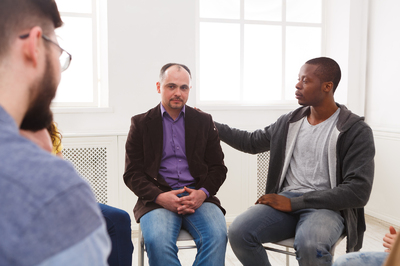Research indicates that members of the LGBT community have disproportionately high rates of substance abuse. In fact, a full 25 percent of gay and transgender people abuse alcohol, compared to just five to 10 percent of the total population. And while group meetings offer the same important benefits to LGBT individuals as they do to straight people, all groups aren’t created equal.
Here’s a closer look at why specialized groups can be particularly helpful to LGBT people, along with where to find a group.

Specialized support groups and treatment may offer LGBT individuals freedom from their addictions.
Key Similarities and Differences
While members of the LGBT community face many of the same challenges as their straight peers, they also have other concerns. Says the Substance Abuse and Mental Health Services Administration (SAMHSA) of the difference: “Some LGBT clients will need to address their feelings about their sexual orientation and gender identity as part of their recovery process. For some LGBT clients, this will include addressing the effects of internalized homophobia. Clinicians sometimes see relapses in LGBT persons with lingering negative feelings about their sexual orientation or gender identity.”
While SAMHSA is speaking in the context of treatment, the takeaways are the same when it comes to Alcoholics Anonymous (AA). The situation is further complicated by the fact that substance abuse is often inextricably interlinked with socializing in the LGBT community, which may mean that the only environments where some LGBT individuals are accepted are also ones where drinking is prevalent. Because of this, it can be even harder for LGBT people to move forward, particularly if they think the result may be isolation.
“I truly believed I could not emotionally survive alone, and so I attached myself to lovers with an extraordinary level of dependence. I was terrified of being abandoned, and the bottom line of each of these relationships was that I would do anything to prevent these lovers from leaving me. Self-esteem and self-respect were unknown to me. I felt worthless and so I acted out accordingly,” said one LGBT alcoholic.
Making the Most of AA
AA meetings welcome everyone, and many members of the LGBT community feel comfortable in non-specialized groups. But while the primary message of recovery from alcoholism remains the same across all groups, the focus may be slightly different. As a result, many LGBT people feel more at home in specialized groups, where they may find more empathy and understanding regarding personal issues.
The mere act of joining an LGBT group may be a stumbling point, but there are payoffs to pushing through. Another LGBT individual said of the process that led him to a gay group, “I refused to go to the gay groups because I did not want to be identified as a homosexual. Because of this, and not being able to let anyone really know me in AA (as this would mean saying I was gay), I did not make any real progress my first six months in AA. I tried to get drunk twice, but for some reason was not able to drink more than four or five beers each time.”
Everything changed, however, when he overcame his fear and attended a specialized group. “I finally went to a gay group and a man came over and talked to me after the meeting. He became my first sponsor. He was able to give me much of the help I needed to start on the road to sobriety,” he continued.

Unique understanding may await in a specialized AA group for LGBT people.
Gays and Lesbians in AA (GaL-AA) was established to support members of the LGBT community in AA. Search the organization’s meeting list to find an LGBT meeting near you.
If you can’t find a group near you, browse Online Intergroups’ directory of online meetings to find a specialized or general meeting near you.
Alcohol abuse is a serious problem in the LGBT community. The good news? There’s always hope. Reveals one LGBT recovering alcoholic, “After coming into AA and listening to people share their experience, strength, and hope, those unnamed fears began to vanish. I realized that the AA people understood me — something I’d been looking for all my life. That terrible apartness from the human race and the loneliness began to disappear.”
In addition to specialized group meetings, a specialized treatment program can also support optimal recovery outcomes. Contact us at Harris House today to learn more about our targeted treatment programs.







